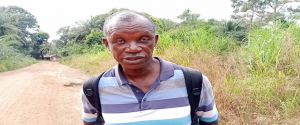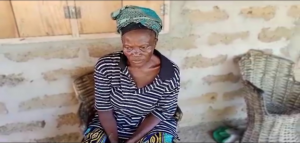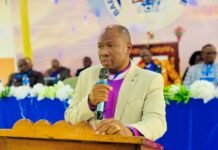
By Alpha Kamara in Washington D.C. and Jonathan B. Omaru in Bonthe District
From Washington D.C. in the Sierra Leone diaspora and echoing through the Bonthe District in Sierra Leone, the call for justice is louder as a prominent FGM practitioner, Sowoh Sandy, is released amidst a legal tangle. The Forum Against Harmful Traditional Practices, represented by the unhappy rights activist Senessie Amara, expresses deep concern over what appears to be a precisely arranged effort to free Sandy, who faced charges of manslaughter and other FGM-related offenses.
Sowoh Sandy, a 65-year-old FGM practitioner, was apprehended earlier in 2023 for charges including manslaughter, forceful initiation, harassment, and inflicting physical pain on Masiray Sei, a 21-year-old mother of two who tragically succumbed to the brutal practice. The grounds for Sandy’s release stem from a seemingly straightforward yet complex issue—the medical examiner’s use of the term ‘Clirodectomy,’ a non-existent word in the English vocabulary, rather than ‘clitoridectomy,’ the known term for the removal of the clitoris in parts or in whole.
Amidst his discontent, Amara insists, “We take exception to the ruling, and we will consult an attorney to appeal the case.” He questions the court’s singular focus on the language error while dismissing crucial elements in the medical report, including profuse bleeding, acute hemorrhage shock, biting of the tongue, and physical harm.
Story Background
Our investigations reveal a disturbing sequence of events leading to Masiray’s death. Abducted from her home in Nyandehun village, Bonthe district on December 18th, 2022, she was forcibly initiated into an FGM secret society the following day and died on December 20th. The subsequent discovery of the body at her family home prompted police involvement, exposing the complicity of FGM practitioners and the issuance of a dubious permit written in Arabic by a subordinate chief who has no authority to issue such.
The discharge of the case on October 29th by Magistrate Momoh Lansana underscores the contentious term in the medical report. The court records state, “The magistrate found the evidence inconsistent with the facts. Also, the medical examiner used the word ‘clirodectomy,’ which is not an English word and cannot be found in the English dictionary.”
Activists suspect a deliberate ploy to manipulate justice, contending that the use of the incorrect term, ‘clirodectomy,’ may have been intentional to appease the influential FGM practitioners in the district and avoid a public outcry.
Amid planning an appeal, activists grapple with the repercussions of the language error—’clirodectomy’ versus ‘clitoridectomy’—and its hidden implications in a significant FGM-related death in the president’s home district.
The plight of the two kids left behind by the deceased.
As the family seeks justice, Isatu Sesay, the mother of the deceased, emphasizes the need for support for the two orphaned children left behind.
“As you support our quest for justice, kindly remember that the deceased left two daughters behind. It is crucial to ensure that they do not endure unnecessary hardship. They require food, shelter, clothing, and educational assistance. It is essential for them to be able to share the story of the impact of Female Genital Mutilation (FGM) in their lives. Your kindness to their needs is sincerely appreciated,” highlighted Isatu Sei, the mother of the deceased, in an interview with our reporter.
The complexity of FGM in Sierra Leone eats deep.
Sierra Leone has one the highest FGM prevalence rates in Africa, with 83% of women and girls aged between 15 and 49 years having undergone the procedure according to the 2019 Demographic Health Survey conducted by UNFPA UNFPA-SIERRA LEONE FGM PREVALENCE.
Although Sierra Leone’s First Lady, Fatima Bio, is widely acclaimed as a global advocate for the rights of girls and women, it is noteworthy that the practice of Female Genital Mutilation (FGM) remains legal in the country. There are varying perspectives within communities regarding the initiation of girls, with some advocating for adherence to the legal age of consent, set at 18. Conversely, other communities propose involving medical practitioners in the cutting process as a measure to mitigate the inherent risks associated with this practice.
Certain activists are advocating for a bloodless initiation regarding Female Genital Mutilation (FGM), promoting a version of the practice that abstains from cutting the clitoris. Their aim is to uphold and preserve the cultural aspects associated with FGM while eliminating the physical cutting involved in the traditional procedure.
This story is produced with support from UNFPA and African Union Ending FGM in Africa Campaign.



